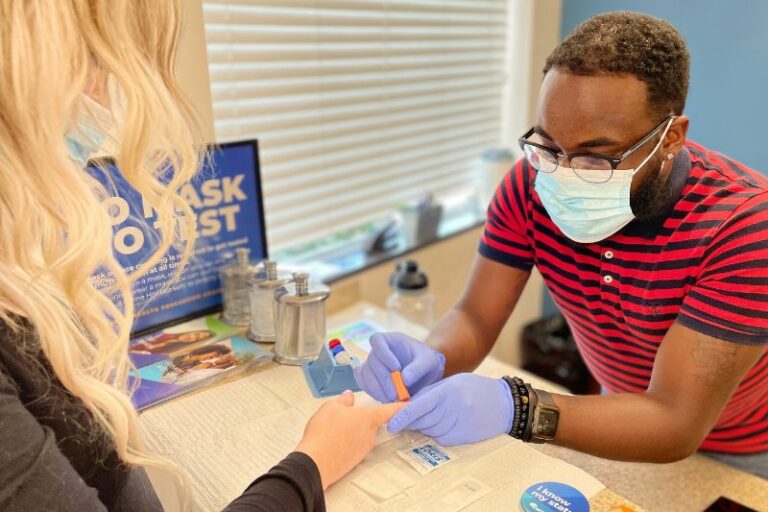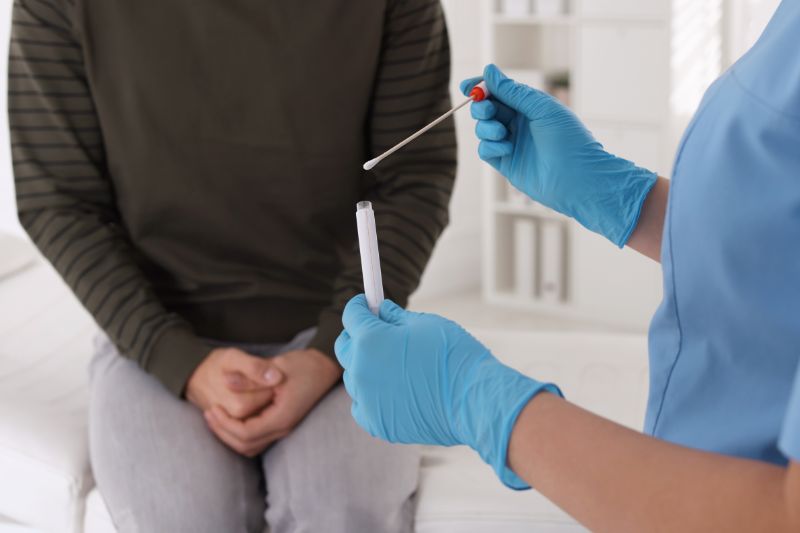Most sexually transmitted infections (STIs) show no symptoms, so it’s important to get tested regularly. To minimize your risk, use condoms or practice abstinence. Some of the most common STIs and potential symptoms are outlined below:
Chlamydia
- Symptoms: painful urination, testicular pain in men, and a discharge from either the penis or vagina
- Transmission: unprotected vaginal, anal, or oral sex, sharing sex toys, and touching parts of the body with fingers (i.e., chlamydia can occur in the eyes).
- Treatment: oral antibiotics
Gonorrhea
- Symptoms: ½ of women and 1/10 of men who have gonorrhea have no symptoms at all. Women’s symptoms can include discharge from the vagina, frequent urination, pain or burning when urinating and pain between periods. Men are most likely to experience pain during urination and discharge from the penis. A throat infection rarely shows symptoms.
- Transmission: unprotected vaginal, anal, or oral sex, sharing sex toys, touching parts of the body with fingers, and from mother to child during child birth.
- Treatment: oral antibiotics
Hepatitis A, B, and C
The word “hepatitis” literally means inflammation of the liver; it is a virus that attacks the liver and causes it to grow in size leading to a wide variety of symptoms.
Viral hepatitis symptoms are similar no matter the type of hepatitis a person has. Symptoms may include fever, loss of appetite, fatigue, jaundice, joint pain, abdominal pain, nausea, vomiting, diarrhea, dark urine, and light or white color feces (poop). If left untreated hepatitis can possibly lead to cirrhosis of the liver, liver cancer, or liver failure.
A vaccine is available for HAV and HBV, if you have not been vaccinated it is recommended that you do so.
HAV
- Transmission: waste-to- mouth; ingesting food or drink contaminated with feces from a person who is infected with or a carrier of HAV.
- Treatment: there is no specific treatment for HAV, but the human body will clear the virus on its own. Any liver damage that occurs will heal within six months of clearing the virus with no lasting damage.
HAB
- Transmission: Blood-to-blood contact and through sexual fluids (vaginal fluid and semen); unprotected sex, sharing needles or equipment used to inject drugs, mother to child during child birth.
- Treatment: if you know you’ve been exposed to the hepatitis B virus, contact a medical provider immediately. If you haven’t been vaccinated, receiving an injection of hepatitis B immune globulin within 12 hours of coming in contact with the virus may help protect you from developing hepatitis B. You should be vaccinated at the same time.
- Acute infection: if it is determined that hepatitis B infection is acute, meaning it is short-lived and will go away on its own you may not need treatment. Instead, your doctor might recommend rest and adequate nutrition and fluids while your body fights the infection.
- Chronic infection: if it is determined that hepatitis B infection is chronic, meaning it will need to be treated to keep it in check or eradicated from the body, treatment to reduce the risk of liver disease and prevent you from passing the infection to others is available and medical care should be sought.
HCV
- Transmission: blood-to-blood contact, most commonly through sharing needles or equipment used to inject drugs and sexual transmission is possible though uncommon.
- Treatment: HCV is curable! A variety of drugs are now available and several others are in clinical trials that are able to cure HCV. New treatments are taken orally for a set amount of time with mild to no side effects for most. Once cured of HCV you can be re-infected with HCV in the future if you engage in activities that put you at risk of contracting the virus.
- Chronic infection: If it is determined that hepatitis C infection is chronic, meaning medical treatment will be needed to cure the virus. Curing HCV will prevent symptoms of HCV in the future and prevent the spread of the virus to new individuals.
- Acute infection: If it is determined that hepatitis C infection is acute, meaning it is short-lived and will go away on its own you may not need treatment. Many people who clear the virus naturally may experience mild flu-like symptoms, but generally no other symptoms.
Herpes
- Symptoms: early symptoms can include a burning sensation in the genitals, lower back pain, pain when urinating, and flu-like symptoms. A short while later, small red bumps may appear around the genitals or on the mouth; later these bumps become painful blisters which then crust over, form a scab, and heal.
- Transmission: skin-to-skin contact
- Treatment: can only be managed by taking a prescription such as Valtrex to manage symptoms and outbreaks. It cannot be cured.
HIV
- Symptoms: some people have flu-like symptoms within 2 to 4 weeks after infection (called acute HIV infection). These symptoms may last for a few days or several weeks. Possible symptoms include fever, chills, rash, night sweats, muscle aches, sore throat, fatigue, swollen lymph nodes, and mouth ulcers.
- Transmission: bodily fluids and through mother-to-child
- Treatment: HIV treatment involves taking medicine that reduces the amount of HIV in your body. HIV medicine is called antiretroviral therapy (ART). There is no effective cure for HIV. But with proper medical care, you can control HIV. Most people can get the virus under control within six months.
Human Papilloma Virus (HPV)
- Symptoms: many types of HPV have no symptoms, although some cause visible genital warts that may be found in the vagina, urethra, cervix, vulva, penis, or anus. Rarely are they found in the mouth or throat.
- Transmission: skin-to-skin
- Treatment: removal of warts through freezing, burning, them off (cauterization), or laser removal. Removing the warts does not guarantee that they will not return. It cannot be cured. The HPV vaccine, Gardasil, is recommended for prevention.
Syphilis
- Symptoms: painless sores that can appear on the penis, vagina, anus or even inside the mouth, mild to severe flu-like symptoms, and (though it is less common) a rash may appear on the soles of the feet and palms of your hands, sometimes even the whole body.
- Transmission: unprotected oral, anal, or vaginal sex
- Treatment: antibiotic injection or oral antibiotics
Trichomoniasis
- Symptoms: men may notice itching or irritation inside the penis, burning after urination/ejaculation or discharge from the penis. Women may notice itching, burning, redness or soreness of the genitals, discomfort with urination and changes in their vaginal discharge.
- Transmission: bodily fluids
- Treatment: trichomoniasis is usually treated quickly and easily with oral antibiotics. Most people are prescribed an antibiotic called metronidazole, which is very effective if taken correctly. You’ll usually have to take it twice a day, for 5 to 7 days. People who have been treated for trichomoniasis can get it again. About 1 in 5 people get infected again within 3 months after receiving treatment.
Find STI testing near you
For free HIV and Hepatitis C testing without an appointment, visit Caracole at our Northside office. Learn more: caracole.org/testing
For additional STI testing, download our guide to local partner STI testing locations in the Greater Cincinnati area: STI Testing Centers



